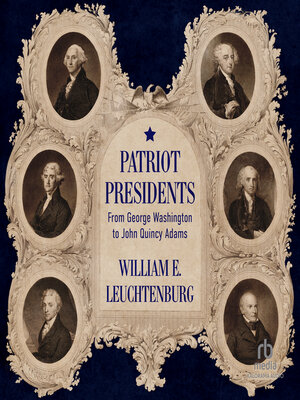Patriot Presidents
audiobook (Unabridged) ∣ From George Washington to John Quincy Adams
By William E. Leuchtenburg

Sign up to save your library
With an OverDrive account, you can save your favorite libraries for at-a-glance information about availability. Find out more about OverDrive accounts.
Find this title in Libby, the library reading app by OverDrive.



Search for a digital library with this title
Title found at these libraries:
| Library Name | Distance |
|---|---|
| Loading... |
The founding fathers of the United States created a unique institution, the presidency, as they were determined to authorize an effective chief executive but wary of monarchy. They endowed this office with broad prerogatives and power but hedged it in with limitations. The presidency that developed over the next generation, however, was fashioned less by the clauses in the Constitution than by the way that the first presidents responded to challenges such as sectional enmity and the vexing Napoleonic warfare that jeopardized maritime rights.
Patriot Presidents explores how the presidency took shape from the medley of clauses handed down to George Washington, who said, "I walk on untrodden ground," for virtually everything he did created a precedent. It then follows the overwhelming challenges faced by his successors, from the austere John Adams who spoke passionately in favor of a strong executive, to Thomas Jefferson, a zealous advocate of American liberties, to James Madison, the creator of the first political party, and James Monroe, whose Monroe Doctrine protected the sovereignty of the Western Hemisphere. It concludes with John Quincy Adams, who could be called the prophet of the expansive twentieth-century state of the Square Deal, the New Deal, the Fair Deal, and the Great Society.
Patriot Presidents explores how the presidency took shape from the medley of clauses handed down to George Washington, who said, "I walk on untrodden ground," for virtually everything he did created a precedent. It then follows the overwhelming challenges faced by his successors, from the austere John Adams who spoke passionately in favor of a strong executive, to Thomas Jefferson, a zealous advocate of American liberties, to James Madison, the creator of the first political party, and James Monroe, whose Monroe Doctrine protected the sovereignty of the Western Hemisphere. It concludes with John Quincy Adams, who could be called the prophet of the expansive twentieth-century state of the Square Deal, the New Deal, the Fair Deal, and the Great Society.







